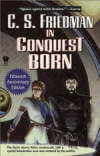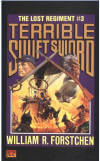 Certainly impressive for a first novel, In Conquest Born details the struggle between Anzha and Zatar, prime representatives of their endlessly warring nations. The structure of the novel is unusual, as every chapter is somewhat like a short story in itself, often with different narrators, viewpoints and styles. The advantage is that exposition can be made from several angles. The disadvantage is a certain feeling of disjointedness as the device weakens the motivation to find out what happens next.
Certainly impressive for a first novel, In Conquest Born details the struggle between Anzha and Zatar, prime representatives of their endlessly warring nations. The structure of the novel is unusual, as every chapter is somewhat like a short story in itself, often with different narrators, viewpoints and styles. The advantage is that exposition can be made from several angles. The disadvantage is a certain feeling of disjointedness as the device weakens the motivation to find out what happens next.
The narrative is epic with regards to time, space, and character development. The characterization is masterful indeed. Friedman goes on a deep dive into the conflicting cultures of the novel, especially the secretive Braxaná. This is, in fact, more a story of people than of technology. Few scenes have more than two or three characters, and we are treated to a well written exposé of the workings of the mind. It is very far from hard SF. While it could be called Space Opera, I would define it a psychological SF story.
Friedman proves that she can write a very complex novel without leaving the reader hopelessly confused. For that she definitely deserves credit. I enjoyed this odd semi-classic, despite the fact that it was a slog at times. At the end was the reward. The surprise ending made everything clear, tying up the many many tangents.








 SciFi humor. I quite enjoyed the first five books or so, but in the end the laughter starts wearing thin. I gave up after “The Stainless Steel Rat Goes to Hell”. Those I have read are:
SciFi humor. I quite enjoyed the first five books or so, but in the end the laughter starts wearing thin. I gave up after “The Stainless Steel Rat Goes to Hell”. Those I have read are:






































